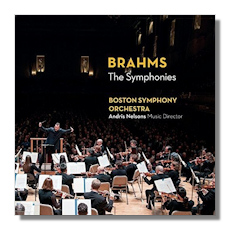
The Internet's Premier Classical Music Source
Related Links
- Brahms Reviews
- Latest Reviews
- More Reviews
-
By Composer
-
Collections
DVD & Blu-ray
Books
Concert Reviews
Articles/Interviews
Software
Audio
Search Amazon
Recommended Links
Site News
 CD Review
CD Review
Johannes Brahms

- Symphony #1, Op. 68 (1876)
- Symphony #2, Op. 73 (1877)
- Symphony #3, Op. 90 (1883)
- Symphony #4, Op. 98 (1885)
Boston Symphony Orchestra/Andris Nelsons
Recorded live
Boston Symphony Orchestra BSO 1701/03 3CDs
My first Brahms recording was an RCA LP with Erich Leinsdorf conducting this very orchestra. In retrospect, it was hardly a great performance, but the beautiful first movement caught my attention and I played it until the poor thing wore out. Later, I turned to Haitink, then Karajan, and later Bernstein. I never forgot that first encounter with the Boston Symphony, though, and eventually my favorite Brahms symphony recordings became Charles Munch's earlier accounts. They are superior to Leinsdorf in every respect, but the Third was not recorded. Haitink's Concertgebouw accounts run rings around his tepid Boston versions, made during a stint as guest conductor. As such, Nelsons becomes only the second Music Director to record a cycle with the orchestra.
Nelsons obviously works very well with his players. All his projects in Boston have been successful, whether on Deutsche Grammophon or the orchestra's in-house label. That said, he does not eclipse Munch in terms of excitement, nor do the live sonics far surpass the "Living Stereo" efforts for Munch on RCA. He is better than Leinsdorf and Haitink, but this was not a high bar to clear. Again, Munch did not contribute a Third, but Haitink's was especially dull. This cycle is never dull, but it strikes me as a touch cautious and – for all the beautiful playing – too relaxed in places to be fully effective.
For curiosity's sake, I compared Nelsons to Klemperer's classic set with the Philharmonia Orchestra on Warner Classics, which I had not owed for several years until a recent repurchase. This was hardly a case of simply picking my usual favorite. Careful listening showed that Nelsons had the better sound, maybe even the better orchestra. But Klemperer's keen attention to detail, his emphasis on the composer's crucial woodwind writing, and the inexhaustible forward drive all gave the older conductor the edge. And comparisons to Munch with the same orchestra were equally telling, as the Boston Symphony was simply a more excitable bunch on RCA.
This is a beautifully packaged and recorded project given the live conditions and in-house limitations, and one might carp at the comparisons to Music Directors of the past. But this is what a critic does on record; he compares, contrasts, and recommends based on what is available. In the final analysis, this is easily the best complete Brahms cycle from this orchestra, and thus a worthy memento for the ensemble's many fans. It does not, however, have enough individuality or distinction to make it among the top cycles on disc. Whether you need it, then, will ultimately be a matter of personal taste.
Copyright © 2017, Brian Wigman


















